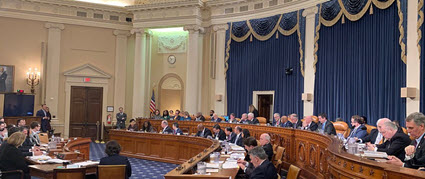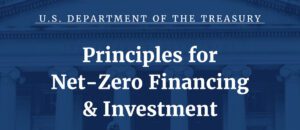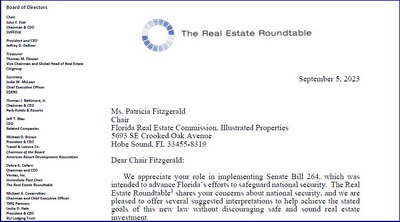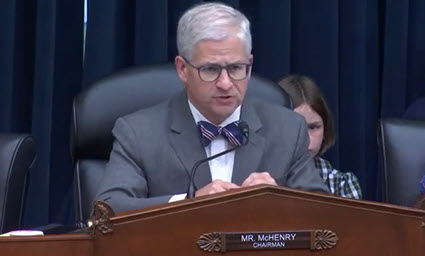
Bipartisan legislation (H.R. 5580) introduced in the House this week would reduce the tax burden on a borrower that can arise when a troubled commercial real estate loan is modified as part of a debt workout. The legislation, introduced by Reps Claudia Tenney (R-NY) and Brian Higgins (D-NY), could help smooth the transition to a healthy and stable post-pandemic real estate market.
Restructuring CRE Loans
Cancellation of Debt (COD) Income

Roundtable President and CEO Jeffrey DeBoer will discuss a range of policy issues facing the industry on Sept. 26 as part of a Marcus & Millichap webcast, “A Conversation with Lloyd Blankfein, Former Chairman and CEO of Goldman Sachs, on the Economy and Commercial Real Estate with Insights from Industry Leaders.” Marcus & Millichap President and CEO Hessam Nadji and former Chairman and CEO of Goldman Sachs Lloyd Blankfein will lead the live webcast discussion on economic factors, including Federal Reserve policy, impacting the commercial real estate market. DeBoer, Tom McGee, President and CEO of ICSC and Sharon Wilson Géno, President of NMHC will join the conversation as CRE industry leaders. (Register here)
# # #

Recent government actions amplify the increasing focus by policymakers on climate laws and guidelines—and their heightened impact on CRE. The California legislature recently passed first-of-its-kind state laws that require companies to disclose their emissions, beating to the punch anticipated federal climate reporting rules from the U.S. Securities and Exchange Commission (SEC). (Politico, Sept. 17)
Meanwhile, the Biden administration issued voluntary principles this week for asset managers, banks, insurers, and venture capital companies with goals for “net zero” emissions investments, including real estate. (Treasury news release, Sept. 19)
California’s Climate Risk Disclosure Package
U.S. Treasury’s Net-Zero Emissions Investment Principles
 The Treasury Department’s Principles for Net-Zero Financing & Investment is focused on “financial institutions’ scope 3 financed and facilitated greenhouse gas (GHG) emissions.” It urges private sector financial institutions to align their GHG reduction efforts and net-zero goals with their “portfolio companies,” “portfolio of assets,” and “client base.”
The Treasury Department’s Principles for Net-Zero Financing & Investment is focused on “financial institutions’ scope 3 financed and facilitated greenhouse gas (GHG) emissions.” It urges private sector financial institutions to align their GHG reduction efforts and net-zero goals with their “portfolio companies,” “portfolio of assets,” and “client base.”
A Sept. 12 podcast featuring Roundtable Senior Vice President & Counsel Duane Desiderio, and Nareit’s Senior Vice President of Environmental Stewardship and Sustainability Jessica Long, discusses the imminent SEC rule and other real estate policy priorities in the energy and climate arena. (Listen to Nareit’s “Real Estate Roundtable says CRE Playing Key Role in Success of Federal Climate Programs”)
# # #

Yesterday, the Florida Department of Commerce proposed a positive clarification to a recently enacted law impacting foreign real estate investment, with implications for similar laws in several other states. The clarification responds to a Roundtable request on Sept. 5 urging the Florida Real Estate Commission to consider specific concerns before implementing the new state law, which could impair capital formation and hinder the important role that legitimate foreign investment plays in U.S. real estate, the broader economy and job growth. (Roundtable letter, Sept. 5 and Roundtable Weekly, Sept. 8)
Section 203
Section 204

DeBoer urged the Commission to “carefully consider the impact of your agency’s interpretation and implementation efforts of this new law so that it does not prohibit major investments in the state, which are safe from control by foreign countries of concern and promote growth without sacrificing the security or economic interests of Florida.” (Roundtable letter, Sept. 5)
# # #

More than two dozen Republicans on the House Financial Services Committee, led by Chairman Patrick McHenry (NC), recently urged banking regulators to withdraw a sweeping set of proposed changes that would significantly increase capital requirements for large banks. The federal Agencies’ proposal—known as the “Basel III Endgame”—represents the final stages of the global regulatory response to the 2008-09 financial crisis. (Bloomberg Government, Sept. 14)
Proposed Agencies’ Rulemaking
Impact on CRE

The Roundtable’s Real Estate Capital Policy Advisory Committee (RECPAC) has established a working group on Basel III that is developing comments, due by Nov. 30, on the Basel III Endgame proposal.
# # #